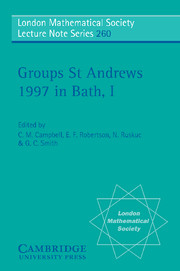Book contents
- Frontmatter
- Contents
- Contents of Volume II
- Introduction
- Radical rings and products of groups
- Homogeneous integral table algebras of degrees two, three and four with a faithful element
- A polynomial-time theory of black box groups I
- Totally and mutually permutable products of finite groups
- Ends and algebraic directions of pseudogroups
- On locally nilpotent groups with the minimal condition on centralizers
- Infinite groups in projective and symplectic geometry
- Non-positive curvature in group theory
- Group-theoretic applications of non-commutative toric geometry
- Theorems of Kegel-Wielandt type
- Singly generated radicals associated with varieties of groups
- The word problem in groups of cohomological dimension
- Polycyclic-by-finite groups: from affine to polynomial structures
- On groups with rank restrictions on subgroups
- On distances of multiplication tables of groups
- The Dade conjecture for the McLaughlin group
- Automorphism groups of certain non-quasiprimitive almost simple graphs
- Subgroups of the upper-triangular matrix group with maximal derived length and a minimal number of generators
- On p-pronormal subgroups of finite p-soluble groups
- On the system of defining relations and the Schur multiplier of periodic groups generated by finite automata
- On the dimension of groups acting on buildings
- Dade's conjecture for the simple Higman-Sims group
- On the F*-theorem
- Covering numbers for groups
- Characterizing subnormally closed formations
- Symmetric words in a free nilpotent group of class 5
- A non-residually finite square of finite groups
The word problem in groups of cohomological dimension
Published online by Cambridge University Press: 05 August 2013
- Frontmatter
- Contents
- Contents of Volume II
- Introduction
- Radical rings and products of groups
- Homogeneous integral table algebras of degrees two, three and four with a faithful element
- A polynomial-time theory of black box groups I
- Totally and mutually permutable products of finite groups
- Ends and algebraic directions of pseudogroups
- On locally nilpotent groups with the minimal condition on centralizers
- Infinite groups in projective and symplectic geometry
- Non-positive curvature in group theory
- Group-theoretic applications of non-commutative toric geometry
- Theorems of Kegel-Wielandt type
- Singly generated radicals associated with varieties of groups
- The word problem in groups of cohomological dimension
- Polycyclic-by-finite groups: from affine to polynomial structures
- On groups with rank restrictions on subgroups
- On distances of multiplication tables of groups
- The Dade conjecture for the McLaughlin group
- Automorphism groups of certain non-quasiprimitive almost simple graphs
- Subgroups of the upper-triangular matrix group with maximal derived length and a minimal number of generators
- On p-pronormal subgroups of finite p-soluble groups
- On the system of defining relations and the Schur multiplier of periodic groups generated by finite automata
- On the dimension of groups acting on buildings
- Dade's conjecture for the simple Higman-Sims group
- On the F*-theorem
- Covering numbers for groups
- Characterizing subnormally closed formations
- Symmetric words in a free nilpotent group of class 5
- A non-residually finite square of finite groups
Summary
Abstract
We show that the finitely presented groups with unsolvable word problem given by the Boone-Brit ton construction have cohomological dimension 2. More precisely we show these groups can be obtained from a free group by successively forming HNN-extensions where the associated subgroups are finitely generated free groups. Also the presentations obtained for these groups are aspherical. Using this we show there is no algorithm to determine whether a presentation is aspherical. There is no algorithm to determine whether a finite 2-complex is aspherical.
Introduction
Fundamental algorithms in combinatorial group theory (the original due to Nielsen [6]) enable one to decide membership in a finitely generated subgroup of a free group. It follows that the free product of two free groups with finitely generated amalgamation has a solvable word problem. Similarly, an HNN-extension of a free group with finitely generated associated subgroups has a solvable word problem. (However, such groups can have unsolvable conjugacy problem and the problem of deciding whether an arbitrary pair of them are isomorphic is unsolvable – see [7].) More generally, the fundamental group of a finite graph of groups whose edge and vertex groups are all finitely generated and free is finitely presented and has a solvable word problem.
- Type
- Chapter
- Information
- Groups St Andrews 1997 in Bath , pp. 211 - 218Publisher: Cambridge University PressPrint publication year: 1999
- 18
- Cited by



